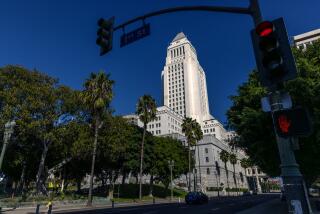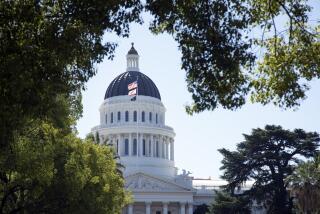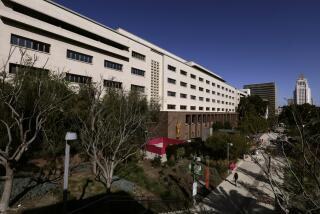Editorial: Beware of coronavirus-inspired attempts to lock you out of L.A.’s public debate
- Share via
When the Los Angeles City Council began canceling its meetings, there was understandable anger and frustration. Social distancing rules adopted because of the novel coronavirus emergency kept the council from convening in person — and, therefore, kept it from adopting crucial measures to respond to the emergency. Why was City Hall stuck with 20th century meeting rules and technologies? Private businesses were teleconferencing, so why not the council? Had it never heard of Zoom or Skype?
And then the council did schedule a special, first-ever Zoom meeting for Friday, and that revealed the flip side of the issue. In part because of the previously canceled meetings and the resulting delays in getting its business done, the council rushed some items onto a special meeting agenda, leaving little time for the public to review the items. There were also questions about just how effectively the public could voice comments or objections in a citywide Zoom meeting.
The county Board of Supervisors also canceled a couple of meetings to give officials time to figure out how to proceed remotely. When the board conducts its first all-electronic meeting Tuesday, the public will have no opportunity to weigh in live. Comments must be submitted by letter or email the day before.
That’s a strikingly lower level of public participation than was contemplated by the Ralph M. Brown Act, the 1953 legislation that properly recognizes that the public’s business is to be done in public, with ample opportunity for constituents to testify as decisions are being made.
Gov. Gavin Newsom acted properly in issuing his March 12 order that (among other things) suspended the portions of the Brown Act that require members of government decision-making bodies to be physically present in the same meeting room, and requiring physical public access to those meetings. City councils, boards of supervisors, school boards, police commissions and all manner of other government agencies have to act to address the emergency while keeping pace with their regular business. And they have to do it without jeopardizing their safety or that of the public.
But as they move forward, they’d better err on the side of transparency, participation and disclosure. That means they should give timely advance public notice of matters to be considered, and they should seek every opportunity — through technology or creativity — to permit more fulsome public input. A time of crisis like this one is exactly when citizens need to hear most from their elected representatives and when they must absolutely be able to register their concerns.
But government will do that only if the public demands it. Many public officials are contemptuous of open-meeting laws. The Los Angeles City Council long had a practice of barring the public from weighing in at “special meetings,” such as Friday’s, convened on 24 hours’ notice instead of the usual 72. The council argued that it had already given the public the opportunity to testify at committee meetings — where actions have less impact, only a few council members are present to hear the input and decisions are lower profile.
That practice aced the public out of meaningful opportunities to present their objections and opinions to the full council on important issues, including proposed real estate developments. In a ruling last year, an appeals court struck down the no-testimony rule as contrary to the Brown Act.
The Board of Supervisors, especially, has a long record of violating the law in order to discuss matters of public importance away from public eyes and ears.
One clever tactic has been to schedule performance reviews of department chiefs, which can legally be conducted in closed session, but to then use those occasions to discuss all manner of issues that concern those departments and that the law requires to be taken up in public.
Local government agencies so routinely violated the Brown Act that voters in 2004 elevated the protections from the statute books to the state Constitution.
The COVID-19 pandemic is a true emergency, one that requires swift and decisive government action, and some decisions may have to be made without the public’s actual presence. But the solution, or part of it anyway, is to move more decisively into the 21st century, whether it be with Zoom or the substantial technological resources collected, for example, through contracts with cable television providers or through the largesse of private companies like Facebook.
When the emergency is over, it may be appropriate to modernize the Brown Act to take into account lessons learned. Perhaps technology can broaden public access even in the best of times. But be wary of government bodies learning the wrong lessons, and getting too used to short notice and limited opportunities for members of the public to testify before their elected leaders.
More to Read
A cure for the common opinion
Get thought-provoking perspectives with our weekly newsletter.
You may occasionally receive promotional content from the Los Angeles Times.










